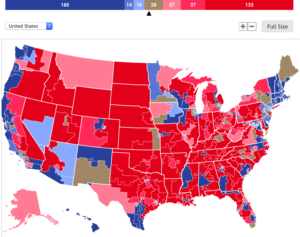Misssissippi holds its legislative elections in November 2023, but November won’t really matter. Why? Well, the State Senate has 52 seats. 13 have only Democrats running, and seven have both major parties. That means, unless a Libertarian can upset a Republican in one of the four seats they’re challenging the GOP, the State Senate is guaranteed a Republican supermajority.
The State House is very similar. 37 seats have only Democrats running, while 17 are contested by both parties. That means that if Democrats win 13 of the 17 contested seats they can block a supermajority, but enough of those seats are strongly Republican that it’s all but impossible. (There are Libertarians and Independents contesting several seats as well, so an unlikely upset there could impact supermajorities.)
So while the general election might technically be on November 7th, the only election that has real impact are the August 8th primaries. And while there are a few interesting primaries on the Democratic side, the winners will be in a minority anyway. No, all of the major action will be the Republican side of the primary.
One interesting thing to always watch in Mississippi primaries is when incumbents are challenged. Now, Mississippi politics are very insider-dominated. It would not be too inaccurate to describe both parties in the legislature as an example of a “good ol’ boy network.” A great example of how this works is on the Democratic side of the Senate primary. Two Senators–Robert Jackson (District 11) and Barbara Blackmon (District 21)–filed for reelection and thus went unchallenged. On the last day of filing, their children filed primary challenges to them. Then they withdrew, effectively handing the seats to their kids. Now, this isn’t considered slimy or abnormal. In Mississippi politics, this is fine, and their kids will presumably represent their seats the same way they did.
Primary Challenges in Mississippi
For primary challenges, you’ll see four general methods. The first one is an “antiestablishment” candidate challenging someone they claim is too entrenched to properly represent the people. The second is the opposite–a challenger might claim that the incumbent is too estranged from the political mainstream to be effective as a legislator. Note that, while often an antiestablishment challenger will accuse the establishment of being less conservative, that’s not always the case. Sometimes the establishment/antiestablishment divide is a statement of attitude or relationship, not policy.
The third type of challenge is an explicit reverse challenge. A moderate might contend that they’ll be more effective. Why would that work in a Republican primary? Well, Mississippi is an open primary state, and many of these districts are completely uncontested in November. So, especially since the Democratic primary for Governor is uncontested, liberal-leaning voters may choose to vote in the Republican primary, and can possibly impact a race.
The fourth–and by far the most likely to be effective–is issue-focused campaigns. Instead of general attacks on a candidate or their attitudes, candidates can find a local niche issue (water issues, direct environmental impacts, business development, local infrastructure, etc.) that functions as a wedge against the incumbent.
So, in the Republican primary, it’s interesting to look where incumbents get serious primary challenges. For example, in District 6, Lauren Smith is challenging Chad McMahan. She is definitely underfunded compared to him, but has more than enough money to seriously campaign. So how does she campaign? She accuses McMahan of being too in touch with the establishment, while she’s antiestablishment, therefore willing to fight those in the establishment. The only other serious primary challenge in the State Senate seems to be District 15, where Alan Sibley is running a somewhat underfunded–with a late spending blitz–antiestablishment (though not quite as hard-right as Smith’s) challenge to Bart Williams.
House of Representatives
Before I begin this section, I should preface that incumbents generally enjoy serious strength in primaries like this. So if neither candidate is spending much, there’s always a solid chance it just means that the incumbent is well-known enough to be safe, and a quick spending blitz in the final week or so (which won’t show up until post-election finance filings) is more than enough to survive. Of course, there’s no way to know if any particular election will see such a dynamic until after it happens, so we’ll look at the state of play as things seem now, always keeping in mind that the quieter a race is, the likelier it is that the incumbent cruises. Of course, there’s also a long trend of politicians getting caught napping because they assume races are safe, and there’s no way to know if that’s what we’re seeing until the results are in, as well.
The first House district that could see an incumbent is District 10. Representative Brady Williamson hasn’t raised or spent much, and is being attacked from two directions. Josh Hawkins has endorsements and serious funding, claiming that he isn’t a career politician and will be pro-business and expand business opportunity in the district. Lofton Gray, meanwhile, has strong funding too and is focusing solely on public education issues. Mississippi is a primary runoff state, meaning that if no one gets over 50% in the primary, the top two move on to a runoff. It looks possible that this district, with three solid candidates, could see a runoff, and incumbents who are forced into primary runoffs are more likely than not to fail for reelection. After all, if a majority of the district wanted to keep the incumbent, they would have won in the first round. It is not clear how actively Williamson is campaigning, but in a state like Mississippi incumbency can be enough, especially when opposition doesn’t have a ton of money or active campaigning either.
In District 81, Ben Shirley has outraised incumbent Steve Horne by a fair amount. Shirley is running on a niche local issue–local businesses industry funding based on local infrastructure. However, he has not filed any itemized disbursements and neither campaign has any real online presence or local media coverage, so it’s very difficult to judge anything about the state of the race from afar.
Like in District 10, it’s not clear that incumbent Dale Goodin is actively campaigning in District 105. He has not raised much money, and spent nothing. He has two opponents, Matt Brewer and Elliot Burch. Neither opponent has spent much money, but both are actively campaigning. Perhaps incumbency and a late push will be more than enough for Goodin, but it bears keeping an eye on.
Another relatively quiet primary is in District 107. Challenger Steve Lott has actually outspent incumbent Doug McLeod by about $10K, mostly on local ads. Lott hasn’t spent a ton of money either, so it’s quite possibly not enough to unseat an incumbent. It’s also not particularly clear (from my distance, at least) if Lott is doing anything to separate himself from McLeod. He seems to mostly be campaigning on the idea that he’ll be good at the job on his own.
Lastly, the most interesting primary challenge, which does not fit in at all with one of the four types above, is in District 23. Basically, this primary is a rematch. Perry Van Bailey and Andy Stepp have very little to separate them, either ideologically or in policy. They are so close that Van Bailey won a Special Election for this seat back in January… by seven votes. So Stepp is back for round two to try to reverse that result.
In general, though, especially in states like Mississippi, the only way to see real turnover in the legislature is in the open seats when incumbents retire. Incumbents lose more often (everywhere) in the first elections after redistricting, because now legislators face at least some unfamiliar territory. Even with that factored in, though, don’t expect too many incumbents to fall in Mississippi this year.
Main Photo Credit: Ballotpedia





